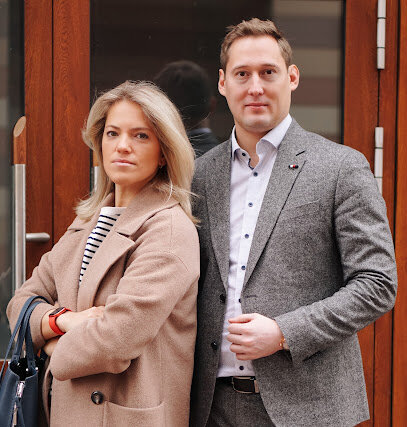Best Licensing Lawyers in Perm
Share your needs with us, get contacted by law firms.
Free. Takes 2 min.
List of the best lawyers in Perm, Russia
About Licensing Law in Perm, Russia
Licensing law in Perm, Russia, governs the formal permission process that individuals and companies use to carry out certain regulated activities. In Russia, licensing is a mix of federal rules and sector-specific regulations, together with regional and municipal requirements that may affect how a license is obtained and maintained in Perm Krai. Typical licensed activities include health care services, production and sale of alcohol, pharmaceuticals, private security and weapons handling, waste management, certain transport services, gambling, broadcasting, and other activities where the state has identified public interest, safety, environmental or social policy reasons for control.
In practice, obtaining a license means proving that you meet technical, professional, financial and location-based requirements; filing an application with the appropriate licensing authority; paying fees where applicable; and allowing inspections or document checks. Licenses can be issued, suspended, amended, revoked or refused for noncompliance. Because licensing decisions can have significant business and legal consequences, many applicants in Perm rely on professional advice to reduce risk and speed up the process.
Why You May Need a Lawyer
Licensing can involve detailed regulatory requirements and administrative procedures. A lawyer can help in many common situations, including:
- Determining whether an activity actually requires a license under federal or regional rules.
- Preparing and checking the full application package - documents, certificates, proof of qualifications, technical plans, and business records - to avoid costly refusals based on formal defects.
- Advising on premises and zoning compliance, sanitary and environmental constraints, and local permitting that interact with licensing requirements.
- Representing you in communications with licensing authorities, arranging inspections, and obtaining clarifications about regulatory expectations.
- Challenging refusals, delays, suspensions or revocations through administrative appeals and, if needed, in the courts.
- Structuring transactions to avoid illegal transfer of licenses and advising on compliance obligations after a license is issued - for example reporting, renewals, record keeping and audits.
- Helping foreign entities or non-Russian nationals navigate registration, translation and representation rules when applying in Russia.
Local Laws Overview
Key aspects of local law relevant to licensing in Perm include the following practical features -
- Federal framework and sector regulators - Licensing in Russia follows federal legislation and sector-specific rules. Many licenses are issued or supervised by federal executive bodies and federal services. These federal rules set the main requirements, lists of documents, and appeal paths.
- Regional implementation - Perm Krai authorities implement federal licensing requirements locally and may set additional regional rules, especially on matters like environmental permits, land use, and municipal approvals. Local departments often coordinate inspections and confirm compliance with local building and sanitary rules.
- Sector-specific technical and professional standards - Activities such as medical services, pharmaceuticals and alcohol distribution require compliance with special technical standards, staff qualification requirements and sometimes specialized premises. Perm-based applicants must meet these standards and present supporting certificates or qualifications from authorized bodies.
- Sanitary and environmental clearance - Rospotrebnadzor or regional sanitary authorities may need to provide opinions or clearance for activities that affect public health. Regional environmental authorities can require permits or impact assessments for activities that affect the environment.
- Inspections and compliance monitoring - Licensing authorities may conduct on-site inspections or document checks. Noncompliance can lead to warnings, fines, suspension or revocation of a license and possibly administrative liability.
- Appeals and judicial review - Administrative decisions about licensing can be appealed within the administrative system and, ultimately, through the Russian courts. In Perm disputes, appeals often proceed through regional administrative bodies and regional courts before escalating to higher courts if necessary.
Frequently Asked Questions
What kinds of activities require a license in Perm?
Activities commonly requiring licenses include health care services, pharmaceuticals manufacturing, production and sale of alcohol, private security and weapons-related activities, gambling, certain transport operations, waste handling and disposal, broadcasting, and some types of construction and industrial operations. Whether a specific activity requires a license depends on federal lists and sector rules; regional and municipal rules can add additional permits or approvals.
Where do I start when I need a license?
Begin by identifying the exact legal regime for your activity - check federal and regional lists of licensable activities. Contact the relevant licensing authority to request an application checklist and guidance. Gather required documents - company registration, technical plans, staff qualifications, premises documents and safety certificates - and consider a pre-application review by a lawyer or consultant.
What documents are usually required for a licensing application?
Typical documents include an application form, proof of legal status (registration documents), tax registration records, passports or qualification certificates for key personnel, documents proving legal use of premises, technical specifications or safety plans, sanitary or environmental clearances, and payment receipts for fees. Sector rules may require additional specialized certificates or evidence.
How long does the licensing process take in Perm?
Processing times vary by sector and complexity. Simple administrative checks can take a few weeks, while licenses requiring multiple inspections, technical approvals or environmental assessments can take several months. Delays often result from incomplete documentation, required corrections, or long scheduling times for inspections.
Can a license be transferred if I sell my business?
Many licenses are non-transferable without formal approval. Sale of a business may require reapplication or amendment to reflect the new legal entity or change in ownership. Always check the license terms and seek legal advice before completing a sale or transfer of assets to avoid unauthorized operation.
What happens if I operate without a required license?
Operating without a required license exposes you to administrative penalties, fines, forced suspension of activity, confiscation of goods or equipment in some cases, and potential civil or criminal liability if the unlicensed activity causes harm. Authorities may also require corrective measures or closure of premises.
How can I challenge a refusal or suspension?
First use the administrative review or appeal mechanisms provided by the licensing authority - often an internal reconsideration. If that is unsuccessful, you can file an administrative claim in regional courts to contest the decision. A lawyer experienced in administrative and licensing law can prepare the grounds for appeal and evidence to support your case.
Can foreign companies or non-Russian citizens obtain licenses in Perm?
Yes, foreign entities and non-Russian citizens can obtain licenses but additional rules often apply, such as registration requirements in Russia, translated verified documents, apostille or consular legalization where required, and the need for a Russian-based representative or local branch. Sector-specific restrictions may limit foreign participation in some activities, so check the applicable rules before applying.
What obligations come with holding a license?
License holders typically must comply with ongoing reporting, safety and operational requirements, allow inspections, maintain qualified staff, and notify the licensing authority of significant changes such as changes in ownership, location or scope of activity. Failure to comply can lead to fines, suspension or revocation.
How much does legal help cost and how do I choose a lawyer?
Cost depends on complexity and lawyer experience - from fixed-fee packages for straightforward applications to hourly rates or retainers for complex matters and litigation. When choosing a lawyer, look for experience in administrative and licensing law, specific sector experience, client references, clear fee estimates, and knowledge of Perm Krai administrative practice. Check whether the lawyer is registered with the regional bar association and ask for examples of similar cases handled.
Additional Resources
Use these types of resources when researching licensing in Perm:
- Federal legislative and regulatory texts issued by relevant ministries and federal services - these set the primary rules for licensable activities.
- Perm Krai government departments and regional licensing offices - for local procedural rules, regional requirements, and contact points for inspections and approvals.
- Sector supervisory bodies - for example, the federal services and ministries responsible for health, alcohol market regulation, communications, transport, and security - for sector-specific licensing details and technical requirements.
- Rospotrebnadzor and regional sanitary authorities - for sanitary-epidemiological requirements and approvals affecting premises and activities.
- Perm Chamber of Commerce and local business support centers - for practical guidance on doing business locally and procedural assistance.
- Regional bar association and directories of lawyers in Perm - to find qualified legal counsel with administrative and licensing experience.
Next Steps
If you need legal assistance with licensing in Perm, consider this practical sequence:
- Clarify the activity - identify whether your activity is licensable under federal law or subject to permits and which sector regulator applies.
- Gather preliminary documents - corporate registration, tax information, premises documents, staff qualifications and any technical documentation you already have.
- Request formal guidance - contact the regional licensing authority for the official application checklist and any local requirements you must meet.
- Consult a specialist lawyer - for a pre-application review, to identify gaps, to estimate timelines and costs, and to prepare or check application materials.
- File the application - ensure all documents are properly certified, translated and legalized if required, and keep proof of submission.
- Prepare for inspections and compliance obligations - arrange premises, staff training and record keeping in line with the license conditions.
- Plan for renewals and ongoing compliance - set reminders for reporting deadlines and renewals, and maintain contact with legal counsel for changes in law or in your operations.
If you are unsure where to start, a short initial consultation with a Perm-based administrative law or regulatory lawyer can quickly clarify the path forward and help prevent common mistakes that delay licensing. Taking early legal advice often saves time and cost over the lifecycle of a licensed activity.
Lawzana helps you find the best lawyers and law firms in Perm through a curated and pre-screened list of qualified legal professionals. Our platform offers rankings and detailed profiles of attorneys and law firms, allowing you to compare based on practice areas, including Licensing, experience, and client feedback.
Each profile includes a description of the firm's areas of practice, client reviews, team members and partners, year of establishment, spoken languages, office locations, contact information, social media presence, and any published articles or resources. Most firms on our platform speak English and are experienced in both local and international legal matters.
Get a quote from top-rated law firms in Perm, Russia — quickly, securely, and without unnecessary hassle.
Disclaimer:
The information provided on this page is for general informational purposes only and does not constitute legal advice. While we strive to ensure the accuracy and relevance of the content, legal information may change over time, and interpretations of the law can vary. You should always consult with a qualified legal professional for advice specific to your situation.
We disclaim all liability for actions taken or not taken based on the content of this page. If you believe any information is incorrect or outdated, please contact us, and we will review and update it where appropriate.










